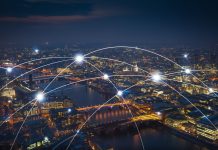Dr Jeremy Aroles explores the implications of COVID-19 technologies, and proposes three ways to ensure that these powers can’t be abused by the Government
The COVID-19 pandemic has had (and is still having) a huge impact on virtually every single country in the world. The ease of travel from continent to continent, country to country, and city to city has enabled the virus to spread uncontrollably, without anyone being able to monitor who and where they may have caught the virus from.
To limit its spread, lockdowns and various other preventative measures have been put in place in the UK (and elsewhere), meaning that the freedom of movement for people has become limited. At its peak, stepping outdoors was only allowed for essential shopping and exercise, households were prohibited from mixing, industries such as hospitality and non-essential retail were almost entirely shut down.
As a result, our already heavy reliance on technology has increased massively, as people began working from home, and using technology more for entertainment and social purposes.
Over the summer, and for many countries which have experienced a second lockdown, our reliance on technology expanded beyond work and entertainment. It has now become vital for public health.
Aside of lockdowns, one of the most important ways to tackle the virus spread is through tracking and tracing those who come into contact with COVID-19. In many countries, track and trace applications have been rolled out in order to monitor citizens’ movements and alert them if they have come into contact with someone who has COVID-19.
Other countries have gone for somehow more even extreme methods of surveillance, ranging from tracking apps to using drones to report lockdown breaches and help enforce such measures.
Governments, public institutions, companies and, increasingly, individuals have justified and legitimised the use of these systems for the sake of safety, thus helping pave the way for a new organisation of our (henceforth much surveilled) freedoms. Unfortunately, the rapid spread and devastating costs of the virus has not allowed us the time and space required to step back and reflect on the far-reaching consequences of the deployment of these newly developed systems on individuals and society.
Many would argue that these apps and technologies actually infringe on our freedom as a society and their use results in people having virtually no privacy from the government or public institutions. Because of the necessity of rapidness in their deployment, they have not been properly scrutinised. However, they do provide a necessary service for our safety. So, how can we ensure these technologies do not infringe on people’s freedoms? In a new research paper, co-authored with my colleague, Professor Aurélie Leclercq-Vandelannoitte from IÉSEG School of Management, I put forward three ways in which we can regulate their use.
1. Questioning our collective responsibility
Firstly, there needs to be a deeper societal reflection on the meaning of “collective responsibility” in society. Our society is made of increasingly complex surveillant systems of control that have been fuelled by the ever-increasing usage of technology.
Our increasing reliance on digital technologies, both in the past and to tackle COVID-19, seems to have blurred our understanding of the boundary between “good and bad” or “right and wrong”. Therefore, while assigning responsibility is crucial, it has also become increasingly difficult in this digital context as we rely on ever-expanding networks of human and technological agencies, which both extend but also somehow dissolve our responsibility.
2. Raising awareness and educating citizens on the impact of technology
Secondly, since the roll out of these technologies will not only be used by a large number of citizens, but it will affect these citizens greatly too, it seems vital that every single individual is completely aware of the risks and implications of adopting the technologies of this control society. Despite the majority of people being concerned over sharing data and the privacy of this, the majority of people using these technologies are often unaware of the implications of their practices.
It is crucial to investigate whether all the possible implications of using such systems have been aptly considered, before the decision to proceed is made, and whether individuals fully understand them. This means educating people to become more aware of the consequences of their actions, whether to help them adopt more cautious behaviours or to enable them to recognise risks and understand exactly what they are signing up to when using these technologies.
3. Regulating partnerships between state authorities and companies
Thirdly it is incredibly important to better regulate the partnerships between the state government, who are keen to roll out technologies and monitor people, and companies in the private sector, who have the funding and knowledge to create such technologies. There must be greater collaboration between businesses, states, and other actors (e.g., universities) in shaping, developing, and governing digital information infrastructures in the age of pandemics, and being transparent about doing so.
Another way this could also be achieved is actually through “countersurveillance”, performed by individuals, investigative journalists and social movements, in order to foster accountability and demand transparency to limit potential abuses by companies and authorities.
Whatever the method, these technologies must be framed with “counter-powers”, which can regulate firms. These should not be shifted to companies to regulate themselves as they could routinely violate the privacy of citizens by seeing in this tragic crisis a mere financial opportunity. Research bodies and institutes that specialise in the management of information systems should be brought in to supervise the developments of digitally enabled control systems, such as COVID-19 apps, not just companies that could violate the privacy of citizens.
Ultimately, regulation is vital to ensure that the COVID-19 pandemic is not utilised as an opportunity to enforce a society of control and to normalise greater surveillance.
Dr. Jeremy Aroles is an Assistant Professor in Organisation Studies at Durham University Business School. His research currently gravitates around three different topics: the emergence of new ways of working, the management of culture, and the relation between fiction and organizational worlds. He is a Fellow of the Higher Education Academy.











